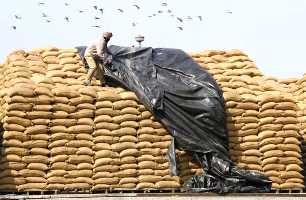 To ward off any grain shortage once all states start implementing the ambitious food security law, the central government plans to increase the buffer stocking and strategic reserve limits of Food Corporation of India for both wheat and rice.
To ward off any grain shortage once all states start implementing the ambitious food security law, the central government plans to increase the buffer stocking and strategic reserve limits of Food Corporation of India for both wheat and rice.
According to a senior government official, the Cabinet is likely to take up a proposal on the matter this week.
The move could push up the requirement by at least 50 per cent from the current norm.
The previous such exercise to alter the buffer norm was in 2005.
After that, an extra five million tonnes of wheat and rice was added as strategic reserve from 2009 on.
The official said the plan to increase the buffer stocking and strategic reserve requirement was developed on the basis of a study by the National Centre for Agricultural Economics and Policy Research.
At present, government foodgrain stocks are almost double the requirement.
The move also fits well with the government’s recent position at the World Trade Organization negotiations at Bali, Indonesia.
The final outcome allowed India to store as much grain as needed to meet requirements under the food law.
The NCAP has recommended that as of April 1 each year, FCI should have about 52 per cent more grain in its warehouses than the current requirement; on July 1, it should be 67 per cent more.
As on October 1 every year, FCI should hold 43.51 million tonnes of grain, against the current requirement of 21.2 mt, which includes a strategic reserve of five
mt.
On January 1, FCI should have stocks of 33.21 mt, which is 32.8 per cent more than the existing requirement, the study recommended.
“The norms have been devised in view of the higher requirement of foodgrain under the new National Food Security Act, to ring-fence against any possible shortfall in output,” Ramesh Chand, director of NCAP, told Business Standard.
The proposed norms will be more or less on the same lines, said the official who was quoted earlier.
The government estimates once all states start implementing the NFSA in letter and spirit over next year, India will have to mandatory distribute 62-64 mt of foodgrain annually, against the current 56-60 mt.
“The study has been conducted based on a 20-year average fluctuation in foodgrain procurement, distribution and storage by FCI,” the official said.
He said the primary reason for raising the buffer stocking and grain reserve norm was to ensure against import.
However, some experts differ. “If we are saying that foodgrain allocation under the NFSA is not going to increase substantially over the current allotments, what is the need for raising the buffer norms?
Considering the problem of wastage and allegation of hoarding, this is not right. It will compel farmers to produce low-value wheat and rice rather than high-value crops,” said Madan Sabnavis, chief economist of CARE Ratings.
If the grain stock requirement is raised by 50 per cent, it means higher procurement and a possible reliance on import if procurement drops, said Ashok Gulati, chairman of the Commission on Agricultural Costs and Prices.

 To ward off any grain shortage once all states start implementing the ambitious food security law, the central government plans to increase the buffer stocking and strategic reserve limits of Food Corporation of India for both wheat and rice.
To ward off any grain shortage once all states start implementing the ambitious food security law, the central government plans to increase the buffer stocking and strategic reserve limits of Food Corporation of India for both wheat and rice.